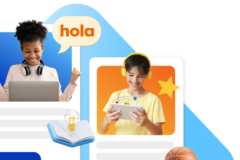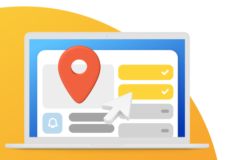Your child has more education options than ever before. The days of being limited by location are over, with online learning breaking down the barriers that once restricted students from accessing personalized, high-quality schooling. Now, any child with a computer and an internet connection can access a world of knowledge from the comfort and safety of home.
But did you know there are different types of online learning programs for school-aged children? More specifically, both public and private school programs can be found online.
This means you can choose between a public or private education without compromising the flexibility of home-based learning. The key is deciding which option best suits your child’s unique needs and your family’s situation.
Are you weighing your child’s choice between online public vs. private school? Confident that home learning is the right fit for your family? If so, you’re in the right place. We’re here to compare private and public online schooling options so you can make an informed, confident decision about your child’s future.
What’s the difference between public and private online schools?
There are three major differences between an online private school vs. public school that parents should be aware of when doing their research.
The three key differences are:
- Tuition
The cost of public vs. private school is one of the first factors to consider when comparing these options. Public schools, including those online, are tuition-free. Parents may still encounter fees for testing, materials, or extracurricular activities, but these tend to be minimal compared to private schooling.
Private online schools, however, charge tuition. While the cost of a private education online may be more affordable than brick-and-mortar options, tuition can still burden some families financially. For this reason, the cost of private school may be a deciding factor for parents.
It is good to note that some online private schools, including some powered by K12, offer scholarships. Please research your specific state school options for full details on tuition costs and financial aid. - Class Sizes
Another important difference in public vs. private schools is class size. Private schools often have smaller classes, which means students can receive more one-to-one attention from their teachers. This personalized learning environment can make a big difference in student engagement and academic success.
On the other hand, public online schools often have larger class sizes. While this can limit individualized attention, many public programs are designed to provide support in other ways, such as through accessible resources and standardized curriculums. Plus, online public school teachers are often trained in how to engage students in a virtual environment. - Curriculum
When comparing private vs. public school options, consider what kind of education you want for your child. Public schools use curriculums aligned with state standards, ensuring consistency in course offerings and teaching. However, they may offer less specialized courses.
Private online schools are not bound by the same guidelines, giving them more flexibility to create unique and specialized programs. These schools may offer a broader range of subjects, including advanced courses, internships, or project-based learning that encourages creativity and independent thinking.
Now that we’ve covered the core factors parents should know, let’s take a closer look at the unique benefits of completing school online. You’ll see how online education offers many advantages that can significantly enhance students’ learning experience and set them up for continued success.
Flexibility in Online Learning
One of the most common reasons parents explore public vs. private online education is for the flexibility it offers. Online learning allows families to create schedules that suit their lives and children to learn at their own pace. This flexibility can be a game-changer for students balancing school with extracurricular activities, travel, or other commitments.
In both public and private online schools, students can enjoy greater flexibility in when they complete assignments, offering a level of freedom that traditional schools may not provide. One benefit of K12-powered private schools is an even greater level of flexibility regarding course schedules and self-paced options.
Customization and Specialized Programs
Both public and private online schools provide opportunities for personalized learning, but private schools tend to lead the way when it comes to specialized programming. Private schools often offer tailored curricula, allowing students to choose from a variety of courses, including advanced classes that can even earn them college credits. Additionally, many private schools offer unique project-based learning experiences and internships, giving students a head start on their future careers.
While public online schools also offer some elective courses (K12-powered online public schools actually have a wide range of electives in their diverse course catalogs, including advanced and dual enrollment options), private institutions generally have more flexibility to design innovative programs that meet individual student interests.
Curriculum and Teacher Quality
Online learning can vary in terms of curriculum, depending on whether you choose private or public school. This is mainly due to the regulatory guidelines to which public schools are subject. Your child can still benefit from a great online public school education; it simply means it’s a more standardized approach to teaching and learning.
The state-aligned curriculum in public schools ensures that all students—regardless of economic status or location—receive a consistent and comprehensive education. The purpose is to prepare students equally for tests, college, and future careers. Online public schools also follow state testing requirements.
Alternatively, online private schools don’t have to follow the same requirements for curriculum or testing. They focus on providing each student with individualized and specialized instruction that supports their unique learning style, strengths, and interests.
Costs and Resources
We briefly mentioned the costs associated with online private schools vs. public schools, but let’s expand on the topic further for a more detailed perspective.
Online Public School Costs
Public online schools are tuition-free, but parents may still need to cover:
- A reliable computer or tablet, required software, and internet services
- Standardized testing fees
- Additional workbooks, textbooks, or other materials
- Participation fees for field trips or in-person events
- Extra fees for dual enrollment programs (earning college credits in high school)
K12-powered public schools are tuition-free and educational materials are provided, often including tech materials like computers. Please research specific school options in your state for a full sense of any costs.
Online Public School Costs
Private online schools are tuition-based* and often come with additional expenses, such as:
- Enrollment or application fees
- Technology fees for maintaining online platforms
- Costs for specialized programs or electives
- Fees for Advanced Placement (AP)® exams or other standardized tests
*Fees and costs associated with online schools can vary significantly from one institution to another. Parents are strongly encouraged to contact the specific school directly to clarify any and all expenses, ensuring a clear understanding of the financial commitments involved in enrolling their child. Always verify details to make an informed decision that aligns with your family’s needs.
Socialization and Extracurriculars
This is a key area where online public schools offer an edge over private education. Due to the larger student populations enrolled in online public schools, there’s a greater demand for social committees and extracurricular programming.
Popular activities offered in the public system include:
- Art competitions
- Esports leagues
- Field trips
- Peer study groups
- Science clubs, art clubs, leadership clubs, etc.
- Online workshops or seminars
- Live online events
- Mentorship programs
Online private schools may offer fewer socialization opportunities due to their smaller student populations, but they may still provide some great options, including:
- Field trips
- Small virtual clubs (chess, coding, reading, etc.)
- Online workshops or seminars
- Live online events
- Mentorship programs
But remember, this is a general overview. It’s always best to research specific online public or private schools to see their social activities and extracurricular programs. Each school is different, and some provide a broad range of virtual clubs, events, or even in-person gatherings to help students stay connected. What matters is finding a school that supports your child’s social development alongside their academics since it makes a big difference to their overall learning experience.
K12 offers both public and private school students extensive extracurricular and social opportunities.
Is online private school better than public school?
Concerned parents who want to make the best decision for their child often ask, “Is private school better than public?” The answer? No.
Many people believe that public schools are better than private, or vice versa, but the truth is that either option can lead to a high-quality education. Plus, both can provide your child with a strong foundation of knowledge to help them achieve their post-secondary goals and obtain fulfilling careers. So, neither choice is automatically better than the other—it really comes down to what fits best with your family’s unique situation and your child’s needs.
Making the Best Choice for Your Child
Choosing between online public vs. private education is a big decision, and your careful consideration reflects that you care about your child’s future. At K12, we’re here to help you find the right balance of flexibility, support, and academic excellence. Our programs offer the personalized attention your child needs to thrive, with options for both public and private online schooling.
If you’re ready to take the next step, we’re confident K12 has the resources to help your child succeed. Discover K12’s online school programs and find the best fit for your child’s education.






